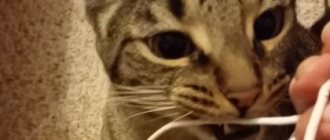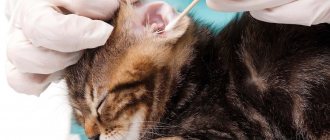The main reasons why cats leave home.
Superstitions have their place, no one is against superstitions, but besides them, there are completely material, objective reasons why a cat or male cat may leave the house.
- A new animal, bird, another cat, puppy or dog has appeared in your home, or a small child has finally arrived. The cat is often a jealous animal and could consider itself the main member of the family, but then someone else appeared.
- Sometimes your cat experiences stress because of the situation in your home, or, for example, because of the annoying behavior of other animals or children. For example, children love to play with a cat, but she doesn’t really like it. It’s worth having conversations with children and teaching them how to handle animals in any case, but if you value a cat, you should carry out similar explanatory work until results are achieved.
- The cat may get lost. A cat is a naturally active animal, unless it is a castrated or sterilized cat. The animal may get too playful or simply get lost in pursuit of prey. In such cases, the cat often finds its way home on its own, but anything can happen.
- The cat left in search of a cat or the cat left in search of a cat during the rutting season. This often happens in the spring, for example in March. Usually within one or two weeks the animals return in this case. In this case, the cat may also return pregnant. Be prepared for this in the spring.
- The cat left the house to die. The cat is an exclusively domestic animal and usually, sensing the approach of its death, leaves the house or wants to hide. In wild animals, in case of illness, the animal moves away from the pack so as not to attract danger to the pack.
Mr. Cat recommends: signs and superstitions
Cats have lived next to humans for many centuries. And mystical abilities have always been attributed to these animals. Even the ancient Egyptians and Buddhist monks believed that cats were guides of souls to the world of the dead, and their death was considered a bereavement.
There are many legends and superstitions about cats, their behavior, and dreams with these animals. There are also some of them that are associated with pets leaving home. They often contradict each other.
Here are some of them:
- The cat anticipates the imminent death of one of the household members and runs away from the supposed trouble. Observations indicate that pets often help the owner’s recovery, constantly lie next to the patient and, “taking away” the disease, go away to die.
- The cat does not run away from imminent death, but takes it with him, averts trouble from his home.
- The pet left to make room for a new tenant. Perhaps a child will be born in the family soon.
- The cat left the house where the seriously ill man was lying, which means he will die soon.
- In Rus', it has long been believed that the cat leaves, taking away all the bad energy from the house, not necessarily foreshadowing the imminent death of someone in the family. And if the cat dies, the owner receives one of its nine lives as a reward for his love. There are known cases when a pet literally threw itself under the wheels of a car, preventing the death of the person it was protecting.
- The cat left because Brownie was angry with the owner and the whole family. The animal understands that it cannot protect them.
- They say that Brownie may not like a black, red or white cat. In this case, no matter which cat is taken into the house, it quickly disappears. They recommend trying to take, for example, a tricolor pet and, when bringing it into the house, ask: “Keeper guardian, master father!” To a rich yard - a furry beast! You take care of him, and I won’t forget you.” And put a treat, for example, milk in a saucer, and put candy next to it.
- There is something “bad” in the house, maybe a magical ritual was performed here. The cat, sensing the presence of evil otherworldly forces, leaves him.
Read about what to do if your cat dies at home and what it could mean.
It is up to the individual to decide whether or not to believe in these superstitions. But, if the owner sincerely loves the pet, he will do everything not to lose him.
Why do young cats leave home?
If a young male or female cat has left the house, the following may be added to the usual reasons for such departure:
Young cats don't have enough experience
A cat can easily run out of an open door or jump out of a window, rushing after an insect or a bird, or finally a cat. Such cases are not rare. Having run out of the house, he cannot find his way back or gets injured. If there is a road next to the house, then such a runaway young kitten may become a victim of a passing car. Lack of experience can also entail the danger of being attacked by a pack of dogs.
The cat's longing for its owner
If the owner has left for a long time or died, the cat may also leave, simply out of worry. Such cases are also not rare.
There was an unfriendly atmosphere at home.
When the atmosphere at home becomes tense, frequent quarrels or even fights occur, cats may also leave. It also happens that a cat feels dislike from someone in the family, and this may also be the reason that the cat wants to run away from home.
They don't like moving
It is known that cats can be worried about moving to a new place of residence. When moving to another home, it is possible that the pet will not feel entirely comfortable because it is outside its usual territory. It is possible that in the new place there are many competing animals nearby and your pet simply does not have a marked place left. To regain its former comfort, the animal can leave the apartment in the hope of finding its previous housing. Animals have a good sense of smell, so they can easily find their way to their former territory.
If the owners have moved to a new apartment, and the pet has disappeared and does not return within several days, the first place to look for it is its previous home.
How to prevent a cat from running away from home
To prevent your pet from being lost to you, take measures to prevent this in advance. For example, it is worth sterilizing a cat, respectively, neutering a cat, unless of course you intend to breed animals. Instead of sterilization, of course, you can use medications, but as practice shows, they are not as harmless as they say on their packaging.
If your cat or cat is of breed class, then such cats are mated twice a year. You shouldn’t let your cat out on its own; if you really want to walk your cat, walk it on a leash; cats get used to the harness quite quickly. Install screens on your windows to prevent your cat from falling out of the window. Treat your cat kindly and feed it on time. Also, do not forget about the front door; it must close tightly to prevent your cat from escaping.
Where do cats go before they die?
The pet tries to find a quiet place near the house. If he lived in a private house, then such a place could serve as a barn, basement, porch, or garden plantings.
A sick cat suffers from an illness and hides from human eyes
Where do cats go to die if they have lived in an apartment all their lives? In this case, they can run to the park, hide behind trash cans in the yard, or under a car. If it is impossible to get out of the house, the pet can hide under the sofa, bed, bathroom, behind a closet, or on the balcony.
Note! It should be a quiet and dark place. The pet rests there, regains its strength, and if it succeeds, it returns to its owner.
Where do cats go from home?
If a cat runs away from home, how can you find it?
Organize a search immediately as soon as you discover that the cat is gone. You shouldn’t delay this, every minute counts, until the cat has gone far, it can still be found. Post advertisements, if you live in the city, place advertisements on specialized animal search sites, and do not forget about social networks. We recommend microchipping the cat, or a collar with a tag containing the owner’s contact details will do. If the cat is not young, look in all the nooks and crannies - maybe he is hiding there.
If the cat dies at home
Perhaps there is so little evidence that cats leave their shelter before death because until recently these freedom-loving animals could roam freely, going about their business and returning back.
The death of a furry pet in the house, on the contrary, was considered atypical. Therefore, the signs associated with this sad event had a negative connotation.
In England there is still a saying that a cat should not be allowed to die in the house, otherwise its inhabitants will be haunted by troubles.
In the modern urban world, where strong doors and multi-story towers prevent cats from leaving the house when they want, this sign is no longer so popular. Not every owner can take a dying pet out of the house and into the street. Therefore, the sign has changed exactly the opposite.
A cat who dies in the house and was cared for until the last minute by loving members of the household becomes a talisman for the family. He will appear as a ghostly shadow to the owners, warning of danger, warding off the evil eye from the house, and extinguishing negativity.
It happens that furry pets die one after another in a certain family or home. The reason for this could be:
- carelessness of the owner, unable to provide the pet with normal living conditions;
- powerful negative energy, trying to cope with which the cat dies. Negativity can appear as a result of quarrels, scandals, a family curse or an external magical attack;
- The Brownie does not accept the new pet. If it cannot be expelled from the house, the animal dies from unexplained reasons.
The mystic and materialist will find among many parables and accept an explanation that satisfies him.
Signs of the imminent death of a purr
Cats age by 12–14 years, but some of them live up to 25 years, which is extremely rare. If your pet has reached old age, then you need to especially monitor its health and take care of it. Unfortunately, cats do not always die of old age. In any case, the signs described below can determine that death is approaching:
- Loss of appetite. First, the cat may refuse food, and then water. The following factors are dangerous:
- the animal does not eat throughout the day;
Refusal to eat is a sign of illness in your pet
- the pet has not defecated for two or more days;
- excrement contains blood;
- urine darkened.
- Change in breathing. As an animal ages, its heart stops working normally, so less oxygen enters the lungs and blood than before. The cat quickly and heavily inhales air to replenish its losses. A healthy animal takes 20–30 breaths per minute. If there is shortness of breath and rare breathing, you need to be prepared for the imminent death of your pet. You can easily check the number of breaths by counting the number of times your cat's chest rises.
- Weak heartbeat and low blood pressure. It is not possible to measure blood pressure at home, since this requires special equipment, but you can call a veterinarian to your home. Normally, a cat's heart beats 122–140 beats per minute. If it is overloaded, it becomes more difficult for it to pump blood, which is why the normal indicator changes. Measure your pet's pulse like this:
- place your palm on the left side of the animal behind its front paw;
- count the number of beats within 15 seconds;
- multiply the resulting figure by 4 - you get the heart rate per minute;
- if in the end the number turns out to be less than 60, then the cat’s condition leaves much to be desired.
- Unpleasant smell. It appears due to a decrease in the body’s performance - toxins are not eliminated at all or this occurs partially. Their accumulation leads to the appearance of a specific odor emanating from the pet’s body and mouth.
- Low temperature (below 37.7 ⁰C). This means that the pet's heart has become weak. You can measure the temperature:
- a digital thermometer, inserting its tip into the cat’s rectum;
You can measure your temperature rectally
- a special ear thermometer;
- folk method - if you don’t have any instruments, then touch the cat’s paw pads: cool pads are a sign of a decrease in temperature.
Many of these signs may indicate that your pet is sick. Therefore, do not rush to conclusions and visit a veterinarian.
However, the impending death of a cat cannot always be determined by any signs.
My cat Vasya died as a teenager. We took him from a street cat - she lambed, the kittens had to be given away. The cat was very smart, a favorite of the whole family. We let him outside for a walk. And somehow he returned with a twisted jaw - he had a fight with someone. He couldn't eat - we fed him from a syringe. But this did not help - the veterinarian said that the cat would not survive. Apparently his internal organs were damaged. For two days he lay in the corridor near the entrance - I don’t know why I chose this particular place. The cat was completely exhausted and could no longer eat. He felt very bad, he slept constantly. And then he left and never came back.
Video: Signs your cat is dying
How do cats behave before they die in an apartment when they cannot leave?
Why do cats lie on their backs when they see you?
The average lifespan of domestic cats is about 15 years. When reaching this age, it is necessary to carefully monitor the animal. Some changes in behavior and appearance may indicate imminent death, for example:
- breathing changes, it becomes rapid and heavy. A healthy cat takes up to 30 breaths per minute;
- often the eyes become glassy, the pupils dilate, the tongue hangs;
- heart rate decreases. According to standards, the animal’s pulse should be in the range of 140-220 beats/min;
- the pet refuses to eat its usual food, drink water, loses weight, and the skin becomes flabby;
- Due to a hungry lifestyle, toxins begin to accumulate in the body. Feces and urine are dark in color and in minimal quantities. The mouth smells unpleasant.
Note! The animal tends to constantly lie alone, hiding from household members.
An old cat may not eat anything for several days.
Ways to prevent future escapes
If the cat returned home safely, this does not mean that in the future she will not make new attempts to escape. Although nothing can be done about physiology, the problem can be solved on an emotional level. If the animal only walks on the windowsill or balcony, you need to monitor its safety. It may be necessary to install a protective fence or tightly secured mosquito net.
If a cat likes to go for walks, it is better to neuter him to avoid long absences at the call of nature.
Under no circumstances should you raise your voice at a cat, much less hit it. It is also important to maintain an atmosphere of goodwill and peace in the family, not to quarrel over trifles, and try to be kinder. Cats feel how they are treated and will never live where they are uncomfortable.
Whatever the reason for the cat leaving home, this event teaches you to be more attentive not only to the animal, but also to the situation in the house. These animals never do anything for nothing. If they leave their native walls not at the call of nature, then the reason is most likely serious. It's better to do everything possible to prevent this from happening again.
What to do to get your pet back
When all available ways to return the cat home have been tried (the area is replete with announcements about the disappearance of a “family member”, all nearby and not so nearby yards have been searched, neighbors have been interviewed, a lot of time has passed, and the result is zero), the time comes to turn to rituals. Magic tricks and conspiracies can be considered desperate measures, but sometimes they still work and help a lost cat find its way home.
Folk rituals for returning a pet to the family are not complicated, but they are not recommended for religious people.
The most effective and well-known include the following:
- Place your pet's favorite food in the cat's bowl and place a white candle next to it. When lighting the fuse, you should mentally turn to higher powers and ask them for the cat’s safe return home. Wait until the candle burns out completely.
- Ask the brownie for help; to do this, you need to wrap one rope around all the legs of the dining table, moving clockwise. When tying a knot, contact the brownie, asking to accompany your pet home.
- Pour milk into a bowl and place it on the doorstep overnight with the words: “To my house, to my doorstep.” Throughout the ritual, you should imagine the cat returning home.
If there are reasons to think that the cat left because of a bad attitude towards her, you should mentally but sincerely ask her for forgiveness.











